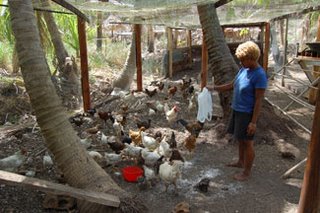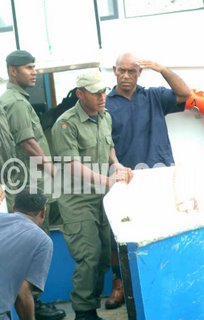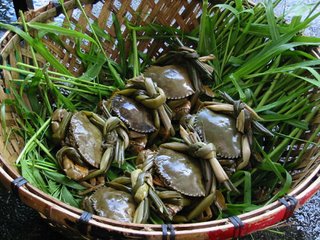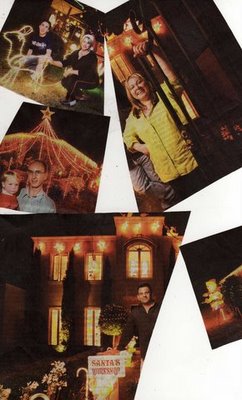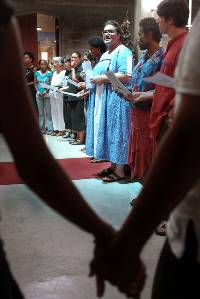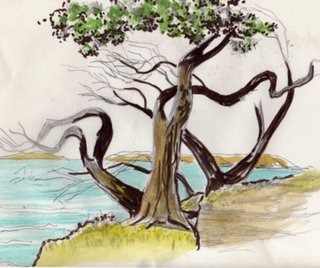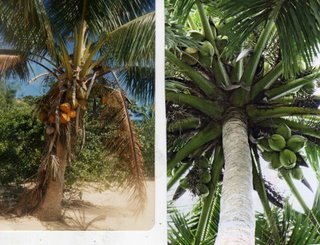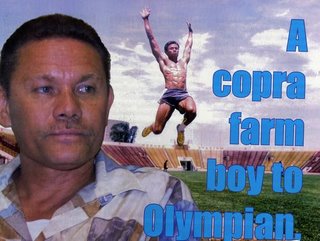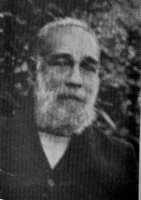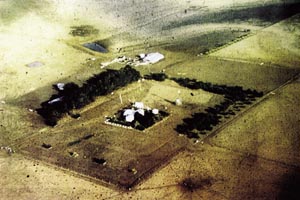

from W.
Are you a builder or a destroyer, or just someone who watches the world go by?
Here's an example of an ordinary man,
John Fenton, who did extraordinary things with his land near Hamilton in the Western District of Victoria. He changed the land from degraded and damaged land to lakes and stands of trees.
From
ABC Landline 10 Dec 2006
Reporter: Pip Courtney
First Published: 02/07/2006
SALLY SARA: Nine years ago, Landline visited a remarkable grazing property near Hamilton in Western Victoria called Lanark. When John Fenton took it over in 1956 it was dry, windswept, overstocked, and virtually treeless. He started planting trees and soon found he could not stop. Without meaning to, he created a Landcare masterpiece, where nature co-existed alongside the family's wool-growing operation. There was a big response to Pip Courtney's original story, and ever since, many people have asked after Lanark and John Fenton. Well, we decided it was time to revisit the tree man of Hamilton.
PIP COURTNEY: This is what the 700-hectare sheep-grazing property, Lanark, looked like in the '50s and '60s, after it had been overstocked, over-cleared and drained. The property, in the heart of Victoria's prime wool-growing country, was clapped out and flogged. This, though, is what Lanark looked like when Landline visited in 1997. A massive man-made wetland thrummed with birdlife and there were tree plantings of every shape imaginable all over the property. There were habitat plantings for wildlife, softwood and hardwood forestry wood lots and shelter belts. The incredible transformation was the work of this man, John Fenton, who, between 1956 and the late 1990s, planted, with the help of his family, hundreds of thousands of trees. At first, he planted trees for shelter and revegetation, but by the early '80s, inspired by what he had seen in New Zealand, John Fenton moved into farm forestry. Here is a slice of the original story.
PIP COURTNEY: It was the first summer and winter at Lanark, burning hot, followed by biting winds and cold, that encouraged John to plant trees around the house. After that, he planted trees to provide shelter for stock and slow the wind across the paddocks. Tree planting became John's weekend hobby and then the hobby turned into an obsession. He became an accidental conservationist, if you like, one that many now say was decades ahead of his time. To chase indigenous tree seed, to try various planting methods and tree varieties, to plant both forest and habitat trees, just to spend money on trees was, in the '50s and '60s, inexplicable.
JOHN FENTON: I think farmers probably at that stage only thought of trees as being aesthetic plantings around homesteads, primarily.
JIM SINATRA: He has created economic futures for his children and his grandchildren by planting two hectares of trees per year that will reap returns of $50,000 or so per hectare, 20-plus a little-plus years down the road, and he has done that by taking about 20% of his property, just under 20% of the property and putting it into all these efforts. And I would like you to show me another farmer in Australia that's done that.
PIP COURTNEY: In the '60s, apart from planting trees, what convinced locals that John was potty was when he gave Lanark back its wetlands. Putting 150 acres of land under water was unheard of. Locals were dumbfounded. While you were building this wetland, what were other farmers in Victoria doing?
JOHN FENTON: They were draining wetlands.
PIP COURTNEY: What did people think of you in the first 10 years that you were here?
JOHN FENTON: I didn't care and I care a damn sight less now.
PIP COURTNEY: We had a huge response to the Lanark story and so did the Fenton family. In nine years, viewer interest in the property hasn't wavered. I'm often asked if the trees are still there and if the next generation has taken over. Given the interest, we thought a visit was in order. The good news is the trees are still there. As you can see from these before and after shots, they've just grown taller, fatter and more valuable.
DAVID FENTON: There was a lot of public reaction, Pip. Yeah, Dad received letters from all over Australia and some from around the world.
PIP COURTNEY: What do you think resonated with people?
DAVID FENTON: I think probably one man's ambition, one crazy man's ambition. I think the fact that this man had decided to turn his 1,700 acre backyard into an oasis.
PIP COURTNEY: From the air, it's clear how different Lanark is to nearby properties. While it's broken up by all manner of shapes and varieties of tree plantings, neighbouring properties still have great expanses of cleared ground. John Fenton had a 100-year plan for Lanark. He says our visit was well-timed because it's 50 years since he took over and the plan is at the halfway mark.
How would you say Lanark has changed since we were here nine years ago?
JOHN FENTON: Well, the big change has been one of shifting for Cicely and myself. It's been a hard thing to do.
PIP COURTNEY: Three years ago, John Fenton and his wife, Cicely, left Lanark and moved into nearby Hamilton. Lanark's wool, prime lamb and farm forestry operations are now run by their son. Your Dad had a particular dream. Is your dream for Lanark the same?
DAVID FENTON: Yes, long-term sustainability. I believe that Dad was at one extreme and that was the wrong extreme. I mean, he was too much one way. We had to increase productivity in order to stay on the land, otherwise we were going to lose the farm, and I've lifted productivity to the extent that I'm happy with where we are........
PIP COURTNEY: He may be regarded as something of an eccentric, but the next generation of Fentons is benefitting from what he calls his headstrong ways.
CATH FENTON: It's only the extremists that sort of open the eyes of everyone around, and you need people like that or we'd all just be so mediocre, that they are really the only people that make a change. He is an inspiration now. He was a madman back then - that's what they thought - but when you look at what he's done, thank goodness he did.
----
The Tree Man from Hamilton
Reporter: Pip Courtney
In 1956, 21 year old John Fenton took over the family farm called “Lanark” about 20 minutes south of Hamilton in Victoria.“Lanark” was 1, 700 acres of Barren, windswept, almost tree-less pasture. It was not that different from most properties because in hose days the law said any crown-purchase lease had to be two-thirds cleared of trees before clear title would be issued.
John Fenton started planting trees. Soon this weekend hobby became an obsession and in the district he was referred to “as that mad tree bloke” He caused further head scratching when he re-introduced the wetlands to the property by bulldozing a 150 acre lake.
“Lanark” today is one of the great examples of property management you would wish to see. About 30 percent is given to over to trees - 10 percent for wildlife habitat and 20 percent for agro-forestry. John Fenton estimates he has spent $250, 000 on trees over the years. When the timber is ready for logging, his son and grandson will have a perpetual income of about $100, 000 every year from timber.
During all this tree-planting, “Lanark” has remained profitable with a steady income from wool and prime lambs.



